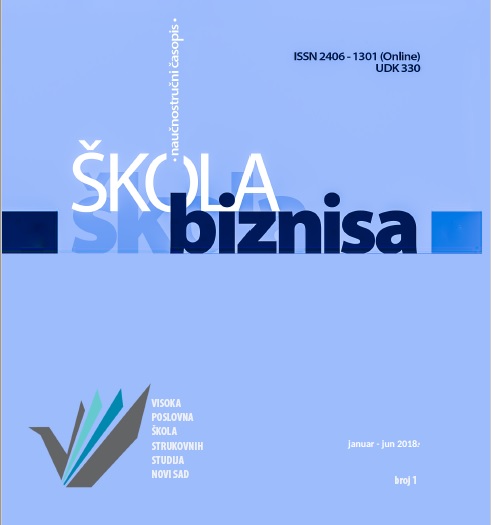STATE FINANCIAL SUPPORT TO COOPERATIVES IN SERBIA
Abstract
Co-operatives in the most developed European countries have a tradition of over 150 years, and among first cooperatives founded in the middle of the 19th century were those on the territory of today's Serbia. Until the beginning of the Second World War, Serbia had a developed and successful cooperative system. In the post-war period, there was a degradation of co-operative system and its departure from the basic cooperative values and principles. The transition period during the 1990s brought new problems through privatization and the creation of unresolved cooperative property. The first visible progress in the development of modern Serbian co-operatives was achieved in 2017 through the introduction of state support to existing and new cooperatives in the amount of 200 million dinars. The initial results indicated that this relatively modest financial state support resulted in establishment of significant number of new cooperatives. Accordingly, more than 800 million dinars were allocated from the budget in 2018 to support the development of co-operatives. Significantly increased state support imposes the issue of budget control and preventing potential misuse, such as the establishment of "false" co-operatives solely for the purpose of receiving financial support. Possible embezzlement could cause in the future the suspension of state support to cooperatives, which can be prevented primarily through the improvement of the cooperative audit system.
References
Birchall, J. & Ketilson Lou, H. (2009). Resilience of the Cooperative Business Model in Times of Crisis, International Labour Organization.
European Association of Co-operative Banks (Evropska asocijacija zadružnih banaka) http://www.eacb.coop/en/home.html (dostupno jun 2018)
International Cooperative Alliance (Međunarodni zadružni savez), http://ica.coop/en/facts-and-figures (dostupno maj 2018).
MacDonald, T., Wallace, G. & MacPherson, I. (2013). Co-operative Enterprise Building a Better World. First Edition Design Pub., Global Co-operative Development Group, Inc, Sarasota
MacPherson, I. (1996). Co-operative Principles, ICA Review 1995. International Co-operative Information Centre, ICA/UWCC, http://www.uwcc.wisc.edu/icic/orgs/ica/pubs/review/ICA-Review-Vol--88-No--4--19951/Co-operative-Principles--ICA-Review-19951.html
Nikolić, M. (2009). Evolucija zadružnog zakonodavstva u Srbiji, DAES - Društvo argarnih ekonomista Srbije.
Nikolić, M. (2014). Primena zadružnih vrednosti i principa i njihov uticaj na poslovanje polјoprivrednih zadruga u Srbiji. Doktorska disertacija, Polјoprivredni fakultet Univerziteta u Beogradu.
Petković, G., Chroneos-Krasavac, B. & Kovačević, V. (2016). Kritički osvrt na pravni okvir kao faktor razvoja zadrugarstva – primer Srbije. Ekonomika poljoprivrede, 63(1), 261-278.
Popis poljoprivrede 2012, RZS
Rixon, D. (2013). Are co-operative principles reflected in performance reporting? a case study of insurance co-operatives. International journal of co-operative management, 6(2), 76-90.
Royer, J. S. (2014). The Neoclassical Theory of Cooperatives: Part II. Journal of Cooperatives, 28(2014), 20-35.
UN (2014): Measuring the Size and Scope of the Cooperative Economy: Results of the 2014, Global Census on Co-operatives. United Nation’s Secretariat, Department of Economic and Social Affairs, Division for Social Policy and Development, http://www.un.org/esa/socdev/documents/2014/coopsegm/grace.pdf
Vlaović-Begović, S. & Tomašević, S. (2016): Odgovornost revizora za otkrivanje računovodstvenih prevara, Škola biznisa, (1), 89-101.
Zakić, V., Nikolić, M. & Tasić, V. (2018): Mogućnosti unapređenja regulative i metodologije zadružne revizije u Srbiji, Revizor, 82/2018, 57-68.
Zakić, Z. (2018). Koop menadžment, Dunav preving, Beograd
Zakon o zadrugama, „Službeni glasnik RS“, broj 112/2015
Zakon o zadrugama, „Službeni list SRJ“, br. 41/1996 i
/1998, „Službeni glasnik RS“, 34/2006
- Authors retain copyright and grant the journal right of first publication with the work simultaneously licensed under a Creative Commons Attribution License that allows others to share the work with an acknowledgement of the work's authorship and initial publication in this journal.
- Authors are able to enter into separate, additional contractual arrangements for the non-exclusive distribution of the journal's published version of the work (e.g., post it to an institutional repository or publish it in a book), with an acknowledgement of its initial publication in this journal.
- Authors are permitted and encouraged to post their work online (e.g., in institutional repositories or on their website) prior to and during the submission process, as it can lead to productive exchanges, as well as earlier and greater citation of published work (See The Effect of Open Access).

